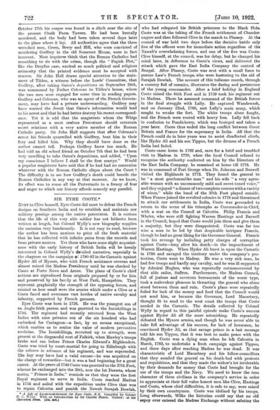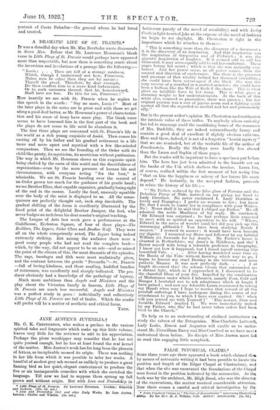SIR EYRE COOTE.* NY.XT to Clive himself, Eyre Coote did
most to defeat the French designs on Southern India and to establish and maintain our military prestige among the native potentates. It is curious that the life of this very able soldier has not hitherto been written at length, but Colonel Wylly's new biography supplies the omission very handsomely. It is not easy to read, because the author has been anxious to print all the fresh material that he has collected with infinite pains from the records and from private sources. Yet those who have some slight acquaint- ance with the early history of British India will be keenly interested in Colonel Wylty's detailed narrative, especially in the chapters on the campaign o: 1780-82 in the Carnatic against Hyder Ali of Mysore, who with French assistance overran and almost ruined the Madras Presidency until he was checked by Coote at Porto Novo and Arnee. The plans of Coote's chief actions are reproduced from originals prepared by or for him and preserved by his family at West Park, Hampshire. They represent graphically the strength of the opposing forces, and remind us how small were the armies which under a Clive or a Coate faced and overcame vast hordes of native cavalry and infantry, supported by French gunners.
Eyre Coote was born in 1726. He was the youngest son of an Anglo-Irish parson and was gazetted to the Inniskillings in 1744. The regiment had recently returned from the West Indies with nine privates out of the six hundred who had embarked for Cartagena—a fact, by no means exceptional, which enables us to realize the value of modern preventive medicine. The Inniskillings, recruited up to strength, were present at the disgraceful rout of Falkirk, when Hawley's troops broke and ran before Prince Charles Edward's Highlanders. Coote was tried by court-martial for going to Edinburgh with the colours in advance of his regiment, and was superseded. The boy may have had a valid excuse—he was acquitted on the charge of cowardice—but it was a bad beginning for a great career. At the peace of 1748 Coote was gazetted to the 37th Foot, whence he exchanged into the 39th, now the 1st Donets, whose motto, " Primus in India," reminds us that they were the first Royal regiment to serve in India. Coote reached Madras in 1756 and sailed with the expedition under Clive that was to regain Calcutta and punish the Nawab Surajah Dowlah, * A A* of Lieutenant-General Sir Eyre Coots, S.B. Compiled by Colonel R. C. Wylly. With an Introduction by Sir Charles Monro. Oxford: at the Clarendon Paces. [24e. vet who had relegated his British prisoners to the Black Hole. Coote was at the taking of the French settlement of Chander- nagore and then followed Clive in the march to Plessey. At the council of war held two days before the decisive battle only five of the officers were for immediate action regardless of the Nawab's overwhelming forces, and one of the five was Coote. Clive himself, at the council, was for delay, but he changed his mind later, in deference to Coote's views, and delivered the attack which gave the East India Company the control of Bengal. After Plessey, Coote was sent with a small force to pursue Law's French troops, who were hastening to the aid of Surajah Dowlah. The account of this toilsome march, through a country full of enemies, illustrates the daring and persistence of the young commander. After a brief holiday in England Coote raised the 84th Foot and in 1759 took his regiment out to Madras. There he assumed command of the British forces in the final struggle with Lally. He captured Wandewash, and on January 22nd, 1760, met Lally's main army, which sought to retake the fort. The white troops alone fought, and the French were routed with heavy loss. Lally fell back in confusion to Pondicherry, which was besieged and taken a year later. Coote thus ended the long conflict between Great Britain and France for the supremacy in India. All that the French could do in later years was to assist disaffected chiefs. like Hyder All and his son Tippoo, but the dreams of a French India had faded.
Coote came home in 1762 and, save for a brief and troubled visit to Madras in 1770, when the local Council refused to recognize the authority conferred on him by the Directors of the East India Company, he remained at home till 1778. He was in command of Fort George when Dr. Johnson and Boswell visited the Highlands in 1773. They found the general to be " a most gentlemanlike man " and his wife " a very agree- able woman with an uncommonly mild and sweet-toned voice," and they enjoyed " a dinner of two complete courses with a variety of wines," while the band of the 37th Foot played outside. When France joined the revolted colonies in 1778 and threatened to attack our settlements in India, Coote was persuaded to return to the scene of his triumphs as Commander-in-Chief, with a seat on the Council at Calcutta. Philip Francis and Wheler, who were still fighting Warren Hastings and Barwell in the Council, hoped that Coote would join them and give them a majority, but they were disappointed. Coote was far too wise a man to be led by that despicable intriguer Francis, though he had no great liking for the Governor-General. Francis took his revenge by including petty charges of corruption against Coote—long alter his death—in the impeachment of Warren Hastings. When Hyder Ali burst in upon the Carnatic in 1780 and ravaged the territory under the company's pro- tection, Coote went to Madras. He was a very sick man, ho had few troops and hardly any cavalry, and he was ill-supported by Admiral Hughes, who was repeatedly outmanoeuvred by that able sailor, Suffren. Furthermore, the Madras Council, full of jealous and covetous bureaucrats of the worst type, took a malevolent pleasure in thwarting the general who alone stood between them and ruin. Coote's plans were repeatedly foiled for lack of the money and food that the Council would not send him, or because the Governor, Lord Macartney, thought fit to send to the west coast the troops that Coote needed in the Carnatic. The details collected by Colonel Wylly in regard to this painful episode make Coote's success against Hyder All all the more astonishing. He repeatedly defeated the Mysore armies, and though he was never able to take full advantage of his success, for lack of horsemen, he convinced Hyder Ali, as that savage prince in a last message told his son Tippoo, that it was best to make peace with the English. Coote was a dying man when he left Calcutta in March, 1783, to undertake a fresh campaign against Tippoo, and three days after reaching Madras he was dead. It was characteristic of Lord Macartney and his fellow-councillors that they assailed the general on his death-bed with protests and requisitions, and that they made the widow's lot intolerable by their demands for money that Coots had brought for the use of the troops and the Navy. We need to know the true character of these civilians in the company's service in order to appreciate at their full value honest men like Clive, Hastings and Coots, whose chief difficulties, it is safe to say, were raised by their own countrymen. Coote was idolized by his troops. Long afterwards, Wilks the historian could say that no old eepoy ever entered the Madras Exchange without salutine the
portrait of Coote Bahadur—the general whom he had loved and trusted.



































 Previous page
Previous page